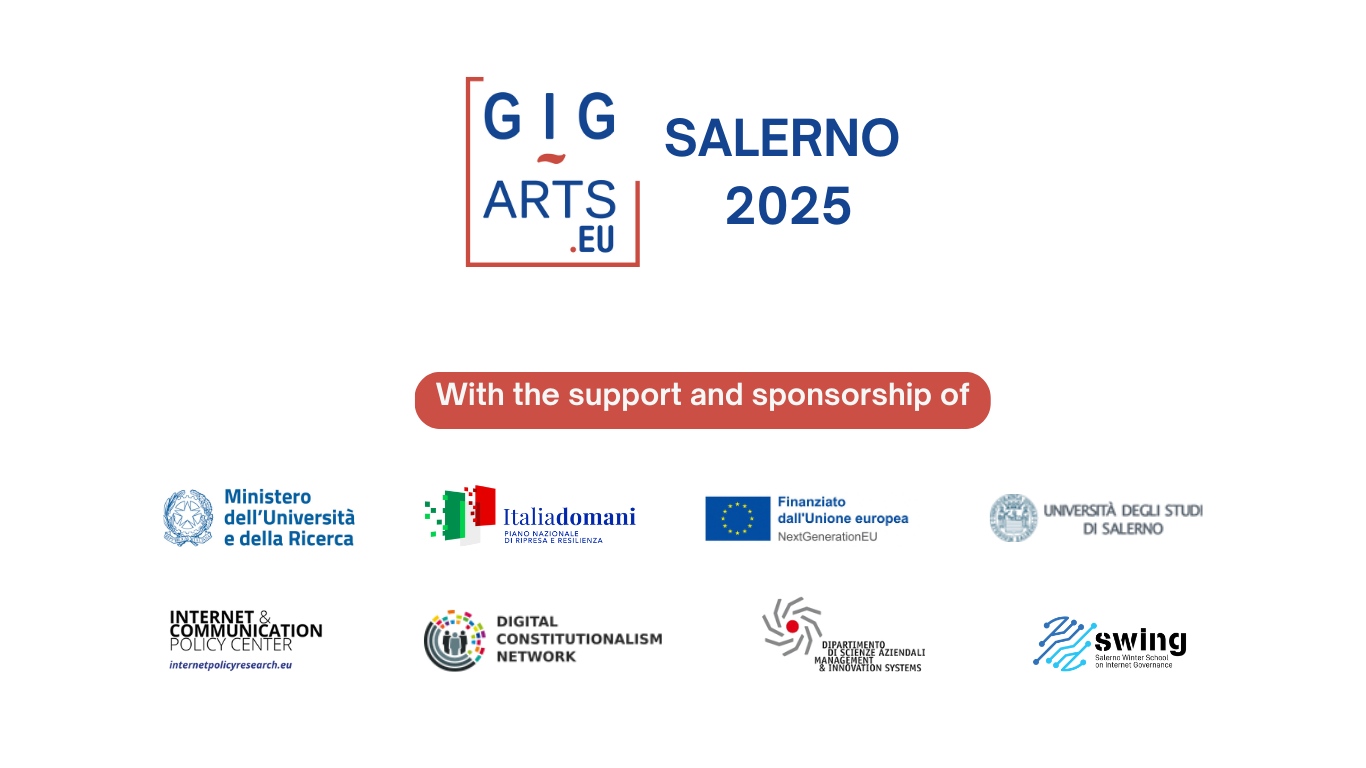GIG-ARTS 2025: “The Rise of Digital Sovereignty: Ambiguities and Challenges.”
Day 1 Overview
The first day included three paper panel sessions:
1. Conceptualizing Digital Sovereignty
2. Geopolitics of Digital Sovereignty
3. Digital Sovereignty and Security
The day concluded with a keynote by Paul Timmers, titled: “Europe in the Battlefield of Geopolitics and Technology.”
Day 2 Overview
The second day included three paper panel sessions:
1. Platform Sovereignty
2. Decolonial and Indigenous Perspectives on Digital Sovereignty
3. Digital Sovereignty and EU Regulation
The programme also included the roundtable: “Researching Digital Sovereignty”. The session showcased a variety of research projects examining digital sovereignty across different regions, actors, and methodological approaches. The day concluded with a keynote by Frédérick Douzet, titled: “How Geopolitics Shapes Cyberspace: a Cartography of Internet Logical Routes”.
Day two also included a social event with a sunset view over the mountains of the Amalfi coast.
Day 3 Overview
The final day of the conference featured 16 paper presentations across four panel sessions, each addressing critical dimensions of digital sovereignty:
1. Data Governance and Data Sovereignty
2. European Digital Sovereignty: Digital Constitutionalism, Digital Autonomy, and Normative Power
3. Infrastructural Sovereignty
4. Digital Sovereignty in Wartime
Want to know more about the GIG-ARTS 2025 Conference? Read about the main theme below and access the abstracts of the papers presented in Salerno.
Main theme “The Rise of Digital Sovereignty: Ambiguities and Challenges.”
The concept of digital sovereignty has gained increasing attention and importance in recent years, driven by a complex array of political and economic motivations, geopolitical tensions, and technological developments. The idea of state sovereignty, once largely limited to territorial boundaries, is now being reimagined and redefined within the context of the digital age. National governments and non-state actors alike are struggling with the need to exert control over data, digital infrastructures, and technological ecosystems, while simultaneously navigating the challenges posed by the global nature of the internet and the influence of digital corporations.
The increasing centrality of digital infrastructure in economic development, national security, and societal well-being has led many governments to reassess their role in regulating and controlling digital networks. This reassessment has been especially prominent in the face of growing reliance on foreign technology providers, concerns over data privacy, and disruptions of global supply chains. Nations like China, Russia, and the European Union have developed policies aimed at asserting their digital sovereignty, each motivated by distinct yet interrelated factors, including national security, economic protectionism, and the safeguarding of fundamental rights. Digital sovereignty is thus positioned as both a response to external vulnerabilities and an assertion of strategic autonomy in an increasingly digital world. Also in the United States of America, the traditional model of internet governance based on private sector leadership, business self-regulation, and global economic competition has been called into question by recent policy initiatives, such as the Huawei ban, restrictions on Chinese apps, the CLOUD Act, and the Chips and Science Act.
Furthermore, many digital sovereignty conceptualizations go beyond a state-centric framework. One prominent perspective focuses on digital sovereignty from a grassroots point of view, which emphasizes the capacity of local communities, indigenous groups, civil society, and individuals to control their digital futures. These perspectives advocate for decentralized and community-driven approaches to digital governance, challenging both state and corporate dominance. Additionally, there are emerging discussions around corporate digital sovereignty as the tech giants’ ability to become autonomous in their productive cycle (managing their own cables, data servers, storage farms etc.), or more broadly their ability to operate across borders, shaping global digital ecosystems and influencing governance decisions in ways that rival or even surpass state authorities. Finally, there are interpretations of digital sovereignty in terms of the sovereignty of cyberspace in itself, meant as self-governance by native digital institutions representing the so-called Internet Community.
The pursuit of digital sovereignty generates significant tensions, particularly between the desire for national control and the need for international and multistakeholder cooperation, and despite its growing prominence, digital sovereignty remains a deeply contested concept.
As a result, digital sovereignty is marked by several ambiguities and contradictions, which reflect the complexity of regulating the digital world. One prominent contradiction lies in the interplay between national autonomy and the extraterritorial projection of power. While governments seek to assert control over their digital landscapes, they also engage in actions that extend their influence beyond national borders, such as imposing data localization rules that have far-reaching implications for international businesses, or enacting digital policies that affect global internet governance. Additionally, digital sovereignty presents a paradox between constitutionalism and authoritarianism. On the one hand, some countries advocate for digital sovereignty as a necessary condition to constitutionalize the digital realm, ensuring that fundamental rights such as privacy and freedom of expression are upheld. On the other hand, the same concept can be used to justify authoritarian practices, such as state censorship, surveillance, and the restriction of access to information.
This conference aims to foster a critical dialogue on the rise of digital sovereignty, addressing its motivations, ambiguities, and contradictions. We invite papers that provide both theoretical insights and empirical analyses, drawing from a wide range of disciplines, including political science, law, economics, communication, science and technology studies. Participants will have the opportunity to engage in discussions that explore the future of digital sovereignty and its role in shaping the global digital order.
Therefore, the Ninth GIG-ARTS Conference especially welcomes papers that address the sorts of questions listed below. We aim to compile a selection of contributions in a journal special issue and/or an edited volume.
- Defining digital sovereignty: Conceptual frameworks and theories
- Comparative perspectives on digital sovereignty
- The economy of digital sovereignty: Protectionism vs. global digital integration
- The geopolitics of digital sovereignty
- Digital sovereignty and digital constitutionalism
- Digital sovereignty and national security
- Motivations and implications of data localization, network territorialization, and platform regulation
- Digital sovereignty and digital colonialism, authoritarianism, and imperialism
- The role of international organizations (WTO, ITU, etc.) in digital sovereignty
- Tech standardization and sovereignty: Competing global norms
- Global digital supply chains and strategic autonomy
- Cybersecurity, weaponization, and digital sovereignty
- Digital sovereignty and emerging technologies
- Digital sovereignty and environmental issues
- Digital sovereignty and Internet fragmentation
As always, alongside the main theme, the GIG-ARTS conference also welcomes papers on other aspects of internet governance.






